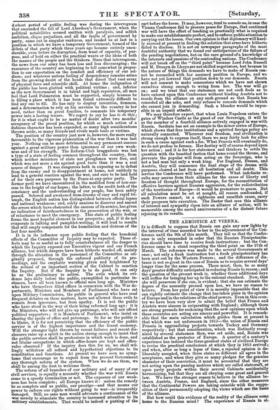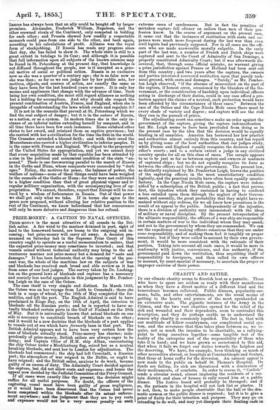THE ARMISTICE AT VIENNA,
Ix is difficult to suppose that Russia can gain any new lights by the interval of time accorded to her in the adjournment of the Con- ference until the 9th of this month. They tell us that the Confer- ence is only suspended in order that the Russian Plenipotentia- ries should have time to receive fresh instructions ; but the Con- ference came to a stand respecting the third point on the 27th of March. The reference was made to the several Governments at once ; not only a fresh instruction but a fresh plenipotentiary has been sent out by the Western Powers ; and the difference of dis- tance is not so great in the case of Russia as to require several days' longer time for the same process. There must, then, be so many days' greater difficulty anticipated in reducing Russia to reason ; and the question of the present week is, whether those additional days will suffice for bringing her up to the rational standard. Now, that she will persevere if she can, is evident; that she can estimate the degree of the necessity pressed upon her, we have no reason to believe. From her point of view it is morally impossible that she can rightly estimate the change that has taken place in the opinion of Europe and in the relations of•the chief powers. Even in this coun- try we have been very slow to admit the belief that France and Austria were sincere in cooperating with England ; although there are strong grounds for reckoning that the new opinions upon which these countries are acting are sincere and powerful. It is remark- able that the main calculation which guides them at present is that which was not unforeseen in 1815—the union of Russia and Prussia in aggrandizing projects towards Turkey and Germany respectively : but that consideration, which was distinctly recog- nized by several statesmen then, was set aside, and, Russia was established as the protector of Europe. A quarter of a century's experience has induced the three greatest states of civilized Europe to revise the practical conclusions at which they in 1815 arrived ; and when, after so long a lapse of time, a rejected opinion is de- liberately accepted, when three states so different all agree in the acceptance, and when they give so many pledges for the genuine character of their conviction, it must be accounted that they are not acting upon the passing motives which are called statecraft; or upon party projects within their several Cabinets accidentally harmonizing, but that they are all obeying some great and general law. We have the stronger reason to believe in the alliance be- tween Austria, France, and England, since the other measures that the Continental Powers are taking coincide with the suppo- sition of their permanently adopting thq views which are the basis of the alliance.
But how could this evidence of the reality of the alliance come home to the Russian mind P The experience of Russia in al- liances has always been that an ally could.be bought off by larger i promises. Alexander, Frederick William, Napoleon, and the other crowned' rival, of the Continent, only competed in bidding for each other ; and Prussia• showed how readily a respectable monarch could pass from one side to the other, and back again, according to his calculations of profit. Alliance was the royal form of atockjobbing. If Russia has made any progress since that day, she has failed to show it. The whole state is still to a great extent in tutelage to its Czar;, and although it is possible that full information upon all subjects of the known sciences may be found in St. Petersburg: at the present day, that knowledge is not diffused throughout the people, nor is it accepted as a gene- ral motive of social or political action. Russia is as exclusive now as she was a quarter of a century ago ; she is as false now as she was then ; . so far as we can judge her by her public acts, her motives, objects; and. courses of action, are exactly the same as they have been for the last hundred years or more. It is only her means and appliances that change with the advance of time. Such being her own condition, she must still regard alliances as nothing but a bidding for accomplices. And why should she respect the present combination of Austria, France, and England, when she is incapable of.understanding the laws which create and regulate it?
It is not in the councils that prevail at St. Petersburg which we find the real subject of danger; but it is in the nature of Russia, as a nation, or as a system. In modern.times she is the only in- stance of an inferior nation extendinglerself by conquest, and in all time there have been few such instances. Rome subdued other states to her sword, and retained them as captive provinces ; but she carried with her a civilization for the time the first in the world. The Crusades extended a.blessed faith ; and with their creed the Mussulmans also carried a higher civilization to inferior peoples. It is the same with France and England. We object to thepropensity of the United States fcir appropriation, and. yet we cannot deny that.every acquisition made by that republic has been attended by sake in the polities' and economical condition of- the state "an- nexed." There is one forewarning parallel to the march of Russia in-the Goths and Mins, whose conquests were succeeded by "dark ages." Policy,. the motives for. peace, the balance of power the welfare of nations—none of these things• could have been:weighed in-the councils of the Goths or Huns ; for they were not cultivated to a higher condition than that of great physical vigour and ir- regular military organization, with the accompanying love of ap- propriation. We cannot, therefore, expect that Europe will he res- cued by a wisdom- of forbearance in Russia. Out of that power we shall 'get only what we take. If in terms she agree to the peace now proposed, without altering. her relative position to the rest of the Continent, we know- beforehand- that her concurrence will only be more delusive and...dangerous than her refusal.



























 Previous page
Previous page